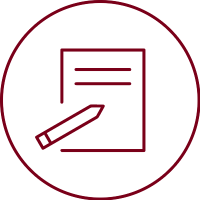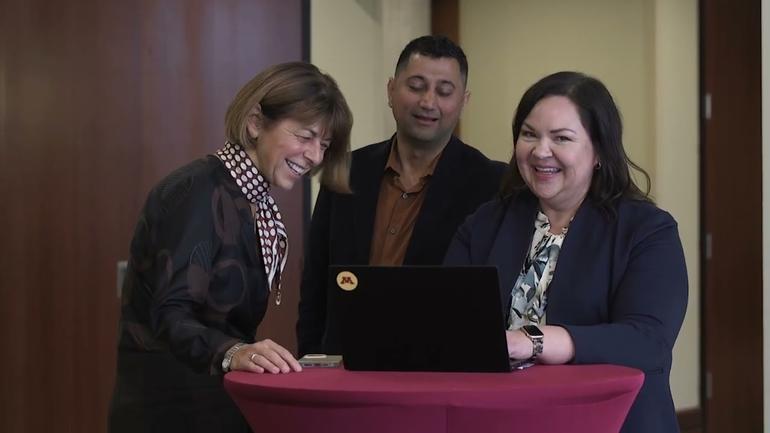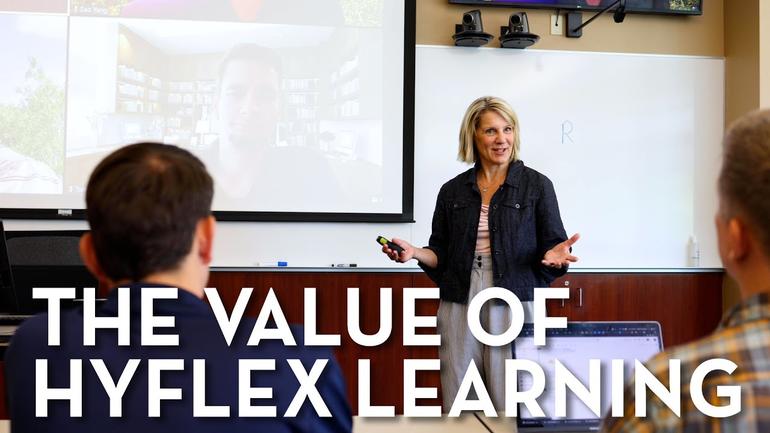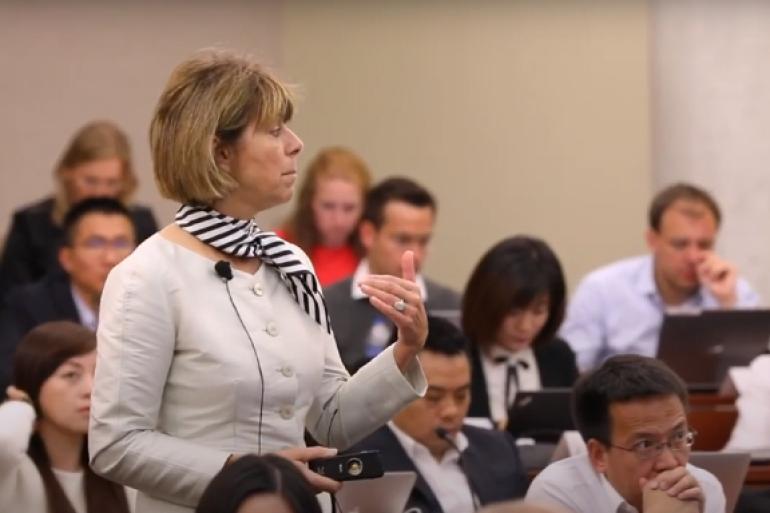Executive MBA Curriculum
20-Month Executive MBA Program: A transformative experience
The Carlson School's Executive MBA program is a 20-month journey that deepens and broadens your business knowledge, cultivates your leadership skills, and establishes a lifelong peer network – all while minimizing disruptions to your work. Starting in September, the program includes a summer break without any classes.
Class Schedule
Fridays & Saturday;
7:30 a.m. - 4:30 p.m.
(every other weekend)
Duration
20 months
Format
In-person or synchronously online
Total Credits
52.5
Executive MBA Curriculum & Faculty
The Carlson School Executive MBA (CEMBA) faculty and curriculum prepare students to succeed and lead in their careers.
What you'll learn
Carlson School’s Executive MBA curriculum equips you with business fundamentals and a deep understanding of best practices, with a focus on strategic management. You’ll improve your decision-making and problem-solving skills and become a more effective leader.
- Year 1: Complete a comprehensive study of core courses that cover the business's basic functions and tools.
- Year 2: Explore a broader business context, develop the ability to deal with complex management challenges, and gain a deeper global perspective.
With a total of 52.5 credits, you’ll develop knowledge in foundational competencies and gain a thorough understanding of an organization’s core functions. You’ll improve problem-solving and leadership skills while getting hands-on experience working globally.
Explore experiences and courses you'll take by core categories below.
Get all the program logistics sorted and get to know your cohort during orientation. You’ll learn about the services available and receive all the essential information you need to start the year, such as picking up your laptop and first semester course materials.
You’ll also begin your Managing Groups course and end the day with a happy hour to network with your new classmates and second-year students.
Kick off each new academic year with classes, workshops, and social events over 4-5 days.
- Year 1 Immersion Week focuses on team processes and leadership development.
- Year 2 Immersion Week prepares you to dive back into classes. You’ll reconnect with classmates and get to know first-year students.
- Economics - 1.5 credits
- Data-Driven Decision Making - 3 credits
- Business Law - 1.5 credits
- Financial Accounting - 1.5 credits
- Competing in the Digital Age - 1.5 credits
- Financial Management - 3.0 credits
- Managerial Accounting - 3.0 credits
- Marketing Management - 3.0 credits
- Customer-Centric Marketing - 3.0 credits
- Organizational Behavior - 3.0 credits
- Business Strategy - 3.0 credits
- Corporate Strategy - 3.0 credits
- Supply Chain - 3.0 credits
- International Management - 1.5 credits
- Human Capital Management - 1.5 credits
- Innovation/Entrepreneurship - 1.5 credits
- Negotiations - 3.0 credits
- Management Groups - 1.5 credits
- Power & Influence - 1.5 credits
- Top Management Perspectives - 1.5 credits
- Executive Leadership Insights - 3.0 credits
- Ethics & Corporate Responsibility - 1.5 credits
- Global Experience - 1.5 credits
- Global Team Project - 1.5 credits
On a regular class day, you'll have class from 7:30-11:30 a.m., take an hour lunch break, and participate in a second class period from 12:30-4:30 p.m.
| Time of Day | Friday | Saturday |
|---|---|---|
| Morning | Ethics | Leadership |
| Lunchtime | Lunch/Break | Lunch/Break |
| Afternoon | Competing Globally | Managerial Accounting |
The Executive MBA program provides you with a chance to learn from distinguished faculty who lead cutting-edge research and shape the future of business. By partnering with top companies to solve present-day business challenges, they provide you with valuable expertise and practical insights. The program's consistent top ranking in teaching and research ensures you get access to the latest knowledge and insights, equipping you with the necessary skills to excel in their careers.
How you'll learn
- Cohort model - Work through the curriculum with the same diverse group of students over 20 months. Participate in enriching discussions of business challenges while cultivating your collaboration and teamwork skills—all critical assets in today’s workplace.
- Alternate weekend classes - Classes are held on Fridays and Saturdays from 7:30 a.m. to 4:30 p.m., mostly on alternate weekends with some back-to-back weekends each semester. Don’t worry–we ensure you have a hearty breakfast and lunch, with snacks throughout the day.
- Hyflex learning - Classes are offered in-person on campus and synchronously (or “live”) online—so you decide which classes you want to take from where.
- Study teams - You’ll be placed in a different study group at the start of each program year to enhance your learning and networking opportunities. Teams are made of diverse perspectives, education backgrounds, careers, and international backgrounds.
The value of hybrid learning
The Carlson School Executive MBA offers you the ultimate flexibility. Classes are offered in-person and synchronously online, allowing you to flex your learning to fit your lifestyle.






